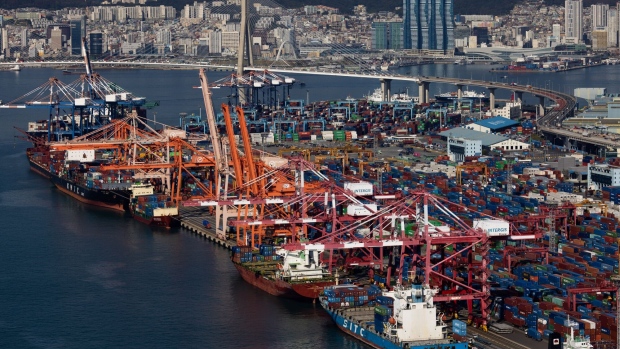Jun 30, 2023
South Korea’s Export Drop Eases, Suggesting Bottom Is Near
, Bloomberg News

(Bloomberg) -- South Korea reported its first trade surplus in 16 months in June, helped by robust automobile exports and a decline in energy imports.
Headline exports dropped 6% from the prior year, according to the trade ministry, and compares with economists’ expectations for a 3.6% decline. Exports sank 15.2% in May. Overall imports fell 11.7% in the period versus 14% the previous month, resulting in a trade surplus of $1.1 billion, the first surplus since February 2022.
The data provide the latest signal that the slump in demand for South Korean goods is easing. Korean exports serve as a barometer of international trade as the nation sells goods that make their way into a variety of items, including chips, displays and refined oil.
“The exports drop has likely already bottomed out, but what’s more important from here is whether recovery will be shaped like a ‘V’ or an ‘L’,” said Moon Junghiu, an economist at KB Kookmin Bank, prior to the data release.
Despite the improvement, lingering uncertainties remain over the timing of a rebound in the chip industry, a major driver of economic growth for South Korea. Future demand largely depends on a more robust expansion in China, Korea’s largest trading partner, and where slack demand has raised concerns about the country’s economic growth.
South Korean exports of chips slumped 28% in June after falling 36% in May, while that of petroleum products were down 41%. Overseas shipments of automobiles jumped 58%.
Shipments to China dropped 19% from a year earlier, marking its 13th straight month of declines, while exports to the US, Korea’s second-largest trading partner, slid 1.8%.
The government will boost efforts to increase exports and improve energy efficiency to achieve a plus figure in exports within the second half of the year, the trade ministry said in the statement.
(Updates with details in final three paragraphs)
©2023 Bloomberg L.P.





